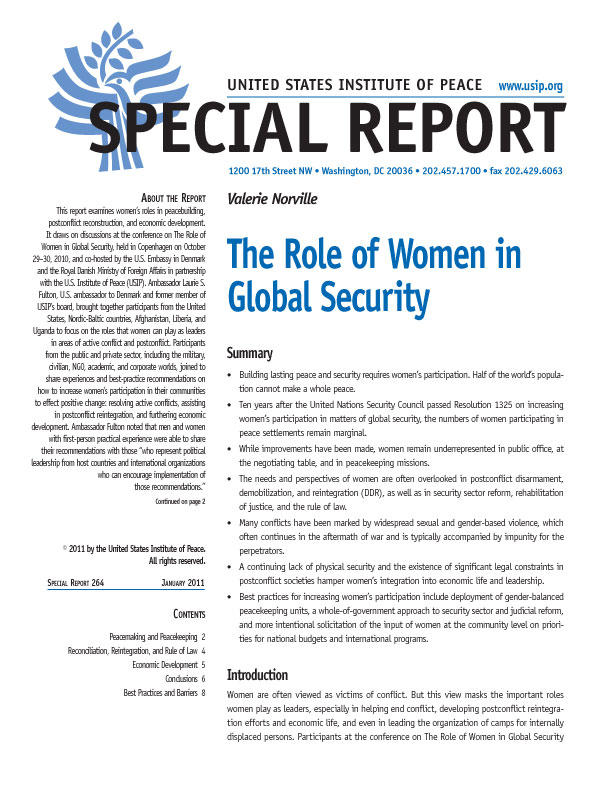The Role of Women in Global Security
This report examines women’s roles in peacebuilding, postconflict reconstruction, and economic development. It draws on discussions at the conference on "The Role of Women in Global Security," held in Copenhagen on October 29–30, 2010, and co-hosted by the U.S. Embassy in Denmark and the Royal Danish Ministry of Foreign Affairs in partnership with the U.S. Institute of Peace (USIP). Ambassador Laurie S. Fulton, U.S. Ambassador to Denmark and former member of USIP’s board, brought together participants from the United States, Nordic-Baltic countries, Afghanistan, Liberia, and Uganda to focus on the roles that women can play as leaders in areas of active conflict and postconflict.

Summary
- Building lasting peace and security requires women’s participation. Half of the world’s population cannot make a whole peace.
- Ten years after the United Nations Security Council passed Resolution 1325 on increasing women’s participation in matters of global security, the numbers of women participating in peace settlements remain marginal.
- While improvements have been made, women remain underrepresented in public office, at the negotiating table, and in peacekeeping missions.
- The needs and perspectives of women are often overlooked in postconflict disarmament, demobilization, and reintegration (DDR), as well as in security sector reform, rehabilitation of justice, and the rule of law.
- Many conflicts have been marked by widespread sexual and gender-based violence, which often continues in the aftermath of war and is typically accompanied by impunity for the perpetrators.
- A continuing lack of physical security and the existence of significant legal constraints in postconflict societies hamper women’s integration into economic life and leadership.
- Best practices for increasing women’s participation include deployment of gender-balanced peacekeeping units, a whole-of-government approach to security sector and judicial reform, and more intentional solicitation of the input of women at the community level on priorities for national budgets and international programs.
About the Report
This report examines women’s roles in peacebuilding, postconflict reconstruction, and economic development. It draws on discussions at the conference on "The Role of Women in Global Security," held in Copenhagen on October 29–30, 2010, and co-hosted by the U.S. Embassy in Denmark and the Royal Danish Ministry of Foreign Affairs in partnership with the U.S. Institute of Peace (USIP). Ambassador Laurie S. Fulton, U.S. Ambassador to Denmark and former member of USIP’s board, brought together participants from the United States, Nordic-Baltic countries, Afghanistan, Liberia, and Uganda to focus on the roles that women can play as leaders in areas of active conflict and postconflict.
Participants from the public and private sector, including the military, civilian, NGO, academic, and corporate worlds, joined to share experiences and best-practice recommendations on how to increase women’s participation in their communities to effect positive change: resolving active conflicts, assisting in postconflict reintegration, and furthering economic development. Ambassador Fulton noted that men and women with first-person practical experience were able to share their recommendations with those “who represent political leadership from host countries and international organizations who can encourage implementation of those recommendations.”



